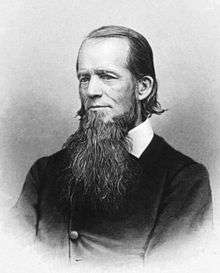James Caleb Jackson
| James Caleb Jackson | |
|---|---|
 | |
| Born |
March 28, 1811 Onondaga County, New York |
| Died |
July 11, 1895 (aged 84) Dansville, New York |
| Occupation | Nutritionist |
| Known for | Granula |
| Part of a series on |
| Seventh-day Adventist Church |
|---|
 |
|
Adventism Seventh-day Adventist portal |
James Caleb Jackson (March 28, 1811 – July 11, 1895) was the inventor of the first dry, whole grain breakfast cereal which he called granula.[1] His views influenced the health reforms of Ellen G. White, one of the founders of the Seventh-day Adventist Church.[2]
Biography
Jackson was born in Manlius, Onondaga County, New York.[1] After completing his education at Chittenango polytechnic institute, he worked as a farmer until 1838. During his early life, Jackson was active as an abolitionist. He lectured for the Massachusetts Anti-Slavery Society, becoming the society's secretary in 1840. From 1844 he moved into journalism, buying the abolitionist newspaper, the Albany Patriot, together with Abel Brown. Jackson continued to manage and write for the paper until 1847 when failing health forced him to retire.
Jackson had been troubled with ill health throughout his life, but saw a remarkable recovery after taking a 'water cure' at a spa. As a result, he spent the second half of his life as an advocate for hydropathy, training to become a physician and opening a hydropathic institute on Skaneateles lake in Cortland County, New York in 1847.
In 1858 he moved to take over the 'Our Home Hygienic Institute' at Dansville, Livingston County, New York. The spa had been founded by Nathaniel Bingham on the site of a mineral water spring, some four years earlier. Under Jackson's management, the spa grew to be one of the largest in the world, catering for around 20,000 patients and was renamed 'Our Home on the Hillside'.[1]
Along with the water cures, Jackson came to believe that diet was fundamental in improving health. Over time, he removed red meat from the menu at the spa, and ruled out tea, coffee, alcohol and tobacco. He promoted a near vegetarian diet with the emphasis on fruits, vegetables, and unprocessed grains.
In 1863 he developed the first breakfast cereal which he named Granula.[3]
Jackson died on July 11, 1895 in Dansville, Livingston County, New York.
Publications
- 1822 Morning Watches
- 1853 Hints on the Reproductive Organs: Their Diseases, Causes, and Cure on Hydropathic Principles
- 1861 The Sexual Organization and its Healthy Management
- 1862 Consumption: How to prevent It, and How to cure It
- 1870 How to treat the Sick without Medicine
- 1870 American Womanhood: Its Peculiarities and Necessities
- 1872 The Training of Children
- 1872 The Debilities of Our Boys
- 1875 Christ as a Physician
See also
- Sylvester Graham (1794–1851), created graham cracker.
- John Harvey Kellogg (1852–1943), started flaked breakfast cereals at his spa.
- Charles William Post (1854–1914), created postum as a patient of Kellogg.
- Maximilian Bircher-Benner (1867–1939), created muesli.
External links
References
- 1 2 3 William Lloyd Garrison (1 June 1971). A House Dividing Against Itself 1836–1840. Harvard University Press. pp. 577–. ISBN 978-0-674-52661-7. Retrieved 6 April 2012.
- ↑ Ronald Numbers (1992). Prophetess of Health: Ellen G. White and the Origins of Seventh-Day Adventist Health Reform. University of Tennessee Press.
- ↑ "Who Made That Granola?". New York Times. March 23, 2012. Retrieved 2013-12-23.
In 1863, Dr. James Caleb Jackson, a health reformer who believed illness was rooted in the stomach, began experimenting with cold cereal to augment the mineral-spring treatments at his sanitarium in upstate New York. ...
| Wikimedia Commons has media related to James Caleb Jackson. |